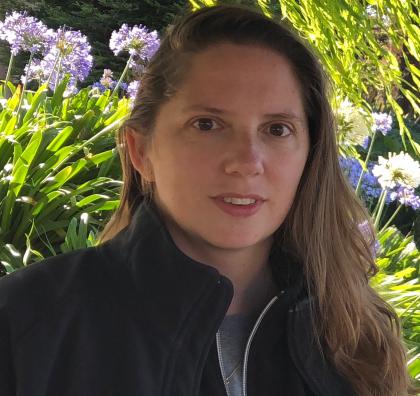Senate Faculty

Jessica Lu
Specialty areas
Adaptive optics,Astrometry,Black holes,Galactic Centers,Optical/infrared instrumentation,Resolved Stellar Populations,Star and Cluster Formation,The Stellar Initial Mass Function.
Research Interests
The Moving Universe Lab, led by Prof. Lu, is conducting a search for free-floating stellar-mass black holes in the Milky Way using gravitational microlensing. Her group also studies how star formation changes in extreme environments such as in massive young clusters and the Galactic Center. These areas of research require precise astrometry (positions) and photometry (brightness) extracted from high resolution infrared images from both space telescopes and ground-based telescopes equipped with adaptive optics (AO). Prof. Lu works on several instrumentation teams that aim to improve AO on the ground and infrared astrometry from space, including the Thirty Meter Telescope IRIS instrument, the ‘imaka project to test very wide-field AO, the W.M. Keck AO system, and the Roman Space Telescope.
Current Group Members
- Matthew Freeman (UCB postdoc)
- Sean Terry (UCB postdoc)
- Casey Lam (UCB grad)
- Hannah Gulick (UCB grad)
- Natasha Abrams (UCB grad)
- Anna Pusack (UCB grad)
- For a complete list, including undergrads and former members, see our Moving Universe Lab website.
Biography
Jessica Lu received her undergraduate degree in physics from the MIT in 2000. She worked as a software engineer in silicon valley for 3 years before returning to academia to pursue her PhD in astronomy and astrophysics at UCLA, which was granted in 2008. After completing her PhD, she was awarded a Millikan Postdoctoral Fellowship in Observational Astronomy at Caltech. She was also an NSF Astronomy and Astrophysics postdoctoral fellow at the Institute for Astronomy (IfA) in the University of Hawaii, Manoa before joining the IfA faculty in 2013. In the summer of 2016, Jessica joined the faculty of the UC Berkeley astronomy department.
Projects
Hunting for Black Holes
Lead:Jessica Lu
We are searching for black holes in the Milky Way using gravitational lensing.
‘imaka
Lead:Jessica Lu
Ultra-wide field adaptive optics demonstrator that corrects image blurring from the Earth's atmosphere due to turbulence near the ground.
